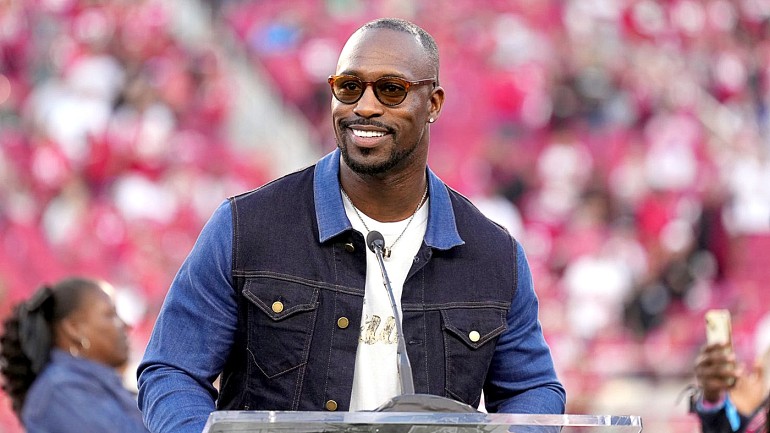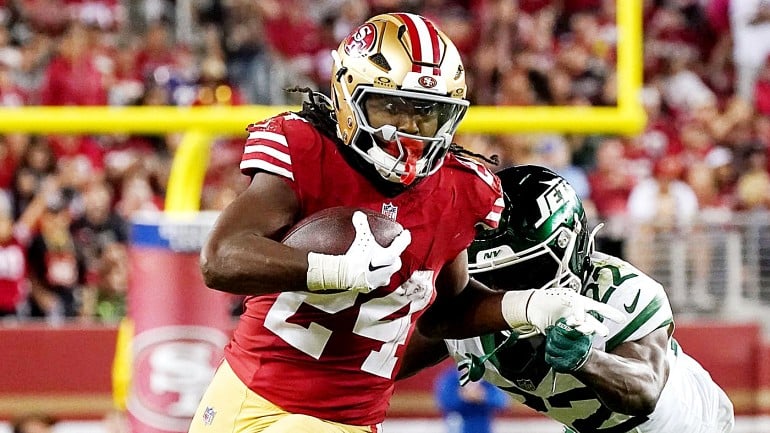The 49ers' offense stymied the Vikings with elements of their personnel and playbook that they had not shown in the preseason. The offense predominately leaned upon the zone blocking scheme (ZBS), as they did during the preseason, but they did so with an unanticipated dependence upon a personnel grouping that required three tight ends. The 13 personnel group (signifying 1 running back and 3 tight ends) allowed the offense to gain an instant advantage at the line of scrimmage, as tight ends should outmuscle defensive backs during running plays, while presenting a coverage challenge for linebackers on passing plays. Coach Jim Tomsula specifically gave credit to Colin Kaepernick for changing between passing plays and running plays at the line of scrimmage to take advantage of the Vikings defense and their attempts to match up with the 49ers' offensive personnel.
The 49ers' defense was similarly effective in revealing new wrinkles for the Vikings players and coaches to contend with. Defensive coordinator Eric Mangini went deep into the roster to make use of the unique traits presented by several players in their respective personnel packages. The bade package took advantage of the size and technique employed by Quentin Dial, Ian Williams, and Glenn Dorsey to control the line of scrimmage and limit rushing yards, while nickel and dime packages relied upon the power, leverage, and quickness of Tank Dial and Arik Armstead to collapse the pocket. Starting defensive backs Eric Reid, Antoine Bethea, Tramaine Brock, and Kenneth Acker were aided by the quickness, toughness, and acceleration of Jimmie Ward in nickel personnel, while both Ward and inside linebacker Michael Willhoite were replaced by Jaquiski Tartt and Dontae Johnson when the 49ers went to dime personnel. Tartt provided superior coverage, compared with Willhoite, while his size, strength, and contact courage prevented the 49ers from giving up a lot of what a linebacker can be expected to provide the defense, such as stopping running plays and blitzing the passer (Tartt recorded the first sack of the game). Johnson gave the defense an outside cornerback with elite size and strength who could control a wide receiver long enough to allow Mangini's elaborate pressure packages to get home.
Michael Zagaris-Getty Images
Now that the 49ers have shown a piece of their playbook, one must wonder if they have become easier to contend with, now that they are more of a known quantity. Offensive coordinator Geep Chryst has already gone on-record stating that the 49ers found enough success with the 13 and 12 (one running back, two tight ends) personnel groupings that he felt little need to go deeper into the playbook. Chryst has already demonstrated the ability to stay ahead of defensive adjustments in week one. While the 49ers featured the 13 personnel grouping throughout the game, they did so by employing the ZBS in the first half. By anticipating that the Vikings coaches would make adjustments to the outside zone (also called "stretch") plays that had gashed their defense in the first half, Chryst took advantage of the patience defenses must exhibit against zone runs by running directly at them in the second half with a handful of gap runs, such as counter, which pulls two linemen from the backside of the run to overwhelm the playside defenders with numbers, downhill blocking, and direct physicality.
Bob Stanton-USA TODAY Sports
I think Chryst will anticipate adjustments to the 13 personnel grouping by the Steelers' coaching staff, and he will be prepared to take advantage of the personnel weaknesses in that defense, as well as their adjustments to what the 49ers chose to show on offense last week. If Bruce Ellington is ready to return from his ankle injury by Sunday, I expect Chryst to count on Ellington's elite quickness and acceleration to break open against the Steelers expectedly slow and surprisingly undisciplined defensive backfield. If Ellington can't go, DeAndrew White would should be able to supply similar quickness and acceleration. I would not be surprised if the Steelers respond to the 49ers success on the ground by rolling a safety into the box, which would allow the 49ers' new and exciting deep threat to exploit single coverage provided by slow cornerbacks deep in the Steelers' defensive backfield.
Many defenses combat ZBS runs by getting vertical penetration into the offensive backfield, rather than running laterally with the flow of the zone run. Vertical penetration makes defenders vulnerable to trap, wham, and kick out blocks, which the 49ers have historically performed well in their gap-blocking scheme. Bruce Miller was used sparingly last week, but he made his name on kick outs on power runs, and can be an effective wham blocker against defensive linemen who get too far upfield.
Just as Geep Chryst revealed that the 49ers have a lot of offensive options that were not revealed in week one, Michael Willhoite stated that Eric Mangini installed much more diversity in the pressure scheme than what he called for the Vikings game. It is no secret that the Steelers have depended heavily upon the dominant play of their All-Pro center Maurkice Pouncey. With Pouncey out for the year, the Steelers must depend on an old 49ers castoff, Cody Wallace, to hold their interior line together. Wallace was cut by the 49ers because he was never stout enough. Even though he had impressive weight room numbers, he could never anchor himself well enough to prevent being forced backward deep into the pocket, and he showed disappointingly heavy feet for a smaller offensive lineman. Wallace already gave up an embarrassing sack against the Patriots, stepping the wrong way in pass protection, then trying to recover by bending at the waist and lunging, rather than moving his feet.
Jonathan Ferrey-Getty Images
Against the Vikings' head coach Mike Zimmer, the innovator responsible for the double-A gap blitz (one linebacker blitzes one gap to the side of the center to force the center to commit their protection to their side, then the other linebacker rushes untouched through the gap on the opposite side of the center), the 49ers modified the double-A concept to victimize The Vikings left guard, Brandon Fusco, who was replacing starter Joe Berger, who had to start at center for the injured John Sullivan. Using the double-A concept to target a position other than center is creative (I guess it should be called an A-B concept…).
That they targeted Fusco is pretty cool. How they victimized him is more impressive. Rather than using two linebackers against one offensive lineman, on a team that likely sees the double-A concept throughout training camp, Mangini let Navorro Bowman, a known threat as a blitzing linebacker, rush first to Fusco's inside shoulder. Then, Antoine Bethea blitzed from depth to run free through the B gap that Fusco allowed to widen while he adjusted to block Bowman. Bethea quickly ran uncontested to his sack of Teddy Bridgewater. The 49ers should be able to use variations of this concept to take advantage of Wallace's slow feet and overall weakness as a pass protector, disrupting the middle of the pocket while Aaron Lynch and Ahmad Brooks hunt around the edges.
Mangini's tendency to disguise his calls should further impact the Steelers pass protection. Several times on Monday, the defense showed as many as seven pass rushers, then only four or five 49ers pursued Bridgewater at the snap. Conversely, the 49ers often brought as many as six rushers after showing an unthreatening three or four players poised to rush. This ability to disguise intent allows Mangini flexibility in getting unblocked rushers to the quarterback, without sacrificing coverage on the back end.
While the Steelers should present a more significant challenge than the confused and often listless and winded Vikings, the 49ers coaches still possess significant opportunity to reveal new wrinkles in both scheme and personnel on both sides of the ball, providing further potential to confuse the Steelers and benefit from hesitation and inspire tentative, thoughtful play by a team that has historically depended upon on instinctive physicality.




